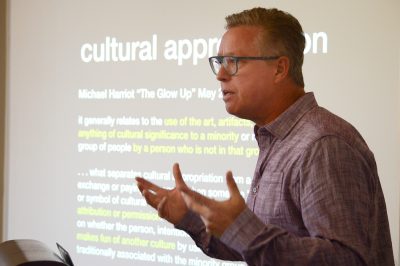Music resonated throughout the room as six chamber choir members of “Voices 21C” sang “Adinu,” a traditional Sufi song. The audience comprised of students, professors and community members listening to the melody of another culture before delving into a conversation on cultural appropriation.

Boston University’s Center for the Study of Asia held a symposium titled “On the Edge: Cultural Appropriation or Cultural Sharing?” Thursday afternoon to discuss cultural borrowing. BUCSA director Thomas Berger said during the panel that the audience was “emotionally blasted away.”
During the forum, three professors with backgrounds in culture and the arts each delved into the intricacies and controversies surrounding appropriation.
Lesley University art history professor Sunanda Sanyal discussed the controversy surrounding the Museum of Fine Arts in 2015 when they created “Kimono Wednesday.”
On that day of the week, guests could wear and take photos in kimonos to celebrate the MFA exhibit for Claude Monet’s “La Japonaise” painting, and critics argued this exoticized and type-casted Asian Americans.
Sanyal said he chose to narrow his scope by zeroing in on an example close to home by discussing the “Kimono Wednesday” controversy. The ensuing protests and counter protests which spawned from the exhibit eventually led to its discontinuation, and the MFA held a public forum to unpack the controversy.
Sanyal analyzed the role that social media played in growing and radicalizing the protests. He said those who viewed the exhibit as a form of exploitation and those who took no issue with it used social media to express their opinions without room for nuanced discussion.
The art history professor said he supported the forum that the MFA held after the exhibit gained notoriety because the talk took a deeper look into the root of the problem. Sanyal said that he worries in this age of social media that heightened controversies will continue to take the place of nuanced discussion, such as what took place in 2015.
Sarah Frederick, a BU professor of Japanese and comparative literature and the forum’s moderator, credited the intricacies of the “Kimono Wednesday” controversy as part of the reason why she chose to moderate the event.
“I’m really interested in the richness of that example and the ways everyone involved had to negotiate their position,” Frederick said.
André de Quadros, Boston University music professor and presenter, spoke at the symposium as well and said he felt it was important to have “a conversation about what constitutes culture, what constitutes appropriate exchange and cultural sharing and what constitutes more acts of exploitation.”
De Quadros talked about culturally significant songs, and with the help of six members of his chamber choir, “Voices 21C,” he performed three different pieces. “Adinu,” a traditional Sufi melody arranged by de Quadros, was played with “Ezekiel Saw the Wheel” and an original rap called “#W88570.”
De Quadros said he chose these songs as a means to demonstrate what it looks like when other cultures are heard respectfully.
“Exclusion is not a way forward, but inclusion comes at a price,” de Quadros said during the panel.
MIT anthropology professor Ian Condry lectured on the history and implications of the Japanese rap scene, and Condry provided a new perspective and looked at cultural appropriation through the lens of the history of Japanese rap music.
In his presentation, Condry said it was important to respect different cultures. He recommended this be done mainly by acknowledging their influence and the power imbalance which exists between them and the dominant culture.
Shying away from other cultures is not the answer, Condry said, and instead, people must make an effort to listen to the complaints of those in minority cultures in order to tackle the power imbalance.
Kate Gilberd, a freshman in the College of Communication, attended the panel and said she believed it was a necessity for students to attend and take advantage of events such as “On the Edge: Cultural Appropriation or Cultural Sharing?”
“I do believe it is important to engage with other cultures,” Gilberd said. “But you have to do it in a respectful way. I think listening to people who understand to a greater extent how to be respectful about it is a really good idea.”
She said she found the subjects addressed enlightening.
“It’s been interesting how the [three] different speakers addressed the concept in different ways,” she said.
CORRECTION: A previous version of this article misattributed a quote. An update version reflects this correction.



















































































































